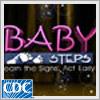[Announcer] This podcast is presented by the Centers for Disease Control and Prevention. CDC – safer, healthier people.
[Announcer] CDC-TV presents Health Matters.
[Announcer]In the U.S., nearly seventeen percent of all children experience some form of developmental or behavioral disability. Recognizing a problem early for disabilities such as autism is key for parents and healthcare providers across the nation.
To help children with potential problems reach a healthier future, CDC realized the impact of developmental disabilities and invested in a campaign known as 'Learn the Signs. Act Early.' The program aims to help parents measure their child's progress in terms of milestones that monitor more than just the physical. Parents can gauge how their child develops by how they play, learn, speak, and act.
[Dr. Georgina Peacock] When a parent is worried that a child may have a developmental problem, there are a number of things they can do. They should talk to their child's doctor; contact the early intervention agency, if their child is under the age of three; or contact their local school district, if their child is over the age of three.
[Announcer] The good news is that the earlier parents and providers recognize children that are delayed in reaching a milestone, the more intervention may help them to reach their full potential. All children develop at their own pace, and many reach particular milestones slightly late or early.
[Dr. Georgina Peacock] A parent may notice that a child is not acting like the other children in their playgroup.
[Dr. Georgina Peacock] What’s the kitty say?
[24 Month-Old Female Child] M-e-e-e-o-o-w-w . . .
[Dr. Georgina Peacock] M-e-e-o-o-w-w . . .
[Dr. Georgina Peacock] The child is speaking later than their brother spoke. This is a time when a parent should go to their child's doctor.
[Announcer] The age that a child takes a first step, smiles for the first time, and waves 'bye-bye' offers important clues. A delay occurs when a child reaches a milestone at an age later than the average developmental rate.
[Dr. Georgina Peacock] Now, show me with your finger . . .
[Announcer] By eight months old, a majority of children turn their heads upon hearing their name, smile back when someone smiles, and enjoy playing games like peek-a-boo. Eighteen month-olds can engage in simple pretend play, point to an interesting object, or speak in single words without prompting.
[18 Month-Old Male Child] Hello . . .
[Announcer] By their second birthday, many children speak in two- to four-word phrases…
[24 Month-Old Female Child] It's Gina's turn.
[24 Month-Old Female Child's Mother] It's Gina's turn?
[Dr. Georgina Peacock] Where's the baby's nose?
[Announcer] …follow simple instructions, and point to objects or pictures when named.
[Dr. Georgina Peacock] Keeping track of how she plays, learns, speaks, and acts is really important. Those are the things that you can do as a mom to learn those early signs of child development. Follow your gut. You’re the expert in your baby and you can make a difference by letting her doctor know if you're worried about something that's going on.
[Announcer] Cindy Gray noticed her daughter, Cathryn, reached some milestones late.
[Cindy Gray] Even though other people were telling me that Cathryn was fine -- it was just that she was premature and very small -- I had a feeling it was something more than that.
[Announcer] Cindy Gray acted early.
[Cindy Gray] Acting early and seeing the signs that something wasn't right with her and then taking those steps to find out what it was -- even though that's really hard to do -- made all the difference for her.
[Announcer] To detect a problem early, connect early with your child and observe how they play, learn, speak, and act.
[Cindy Gray] We were so grateful that Cathryn was diagnosed when she was, because it allowed us to immediately get her the help that she needed.
[Announcer] If you suspect a problem, act early. If your child's development seems to slow down, or your child loses skills, seek a doctor's advice immediately. Most of the time, a developmental problem is not something children grow out of' on their own. But with help, these children can reach their full potential.
[Announcer]For the most accurate health information, visit www.cdc.gov or call 1-800-CDC-INFO, 24/7.



